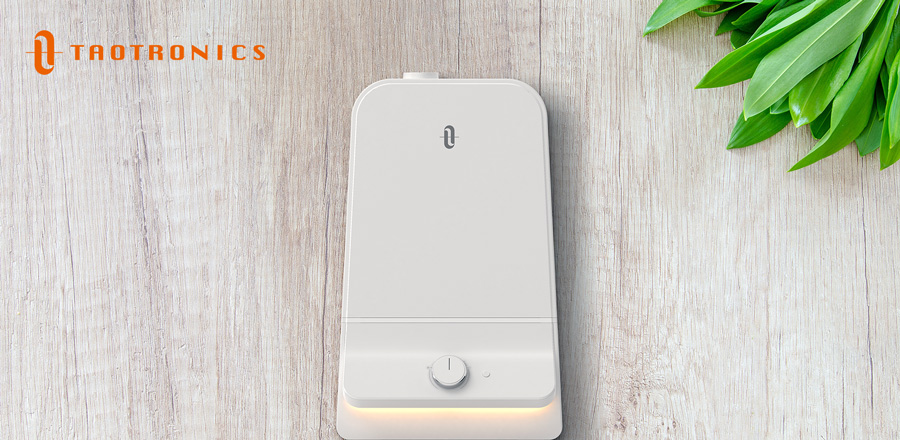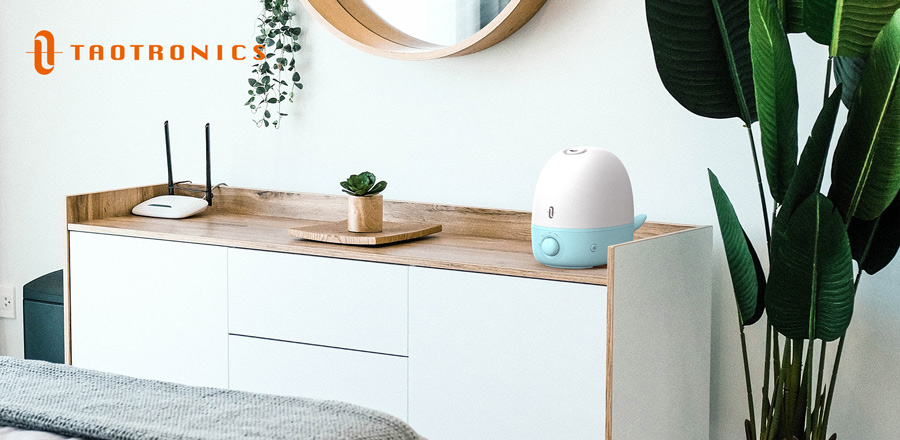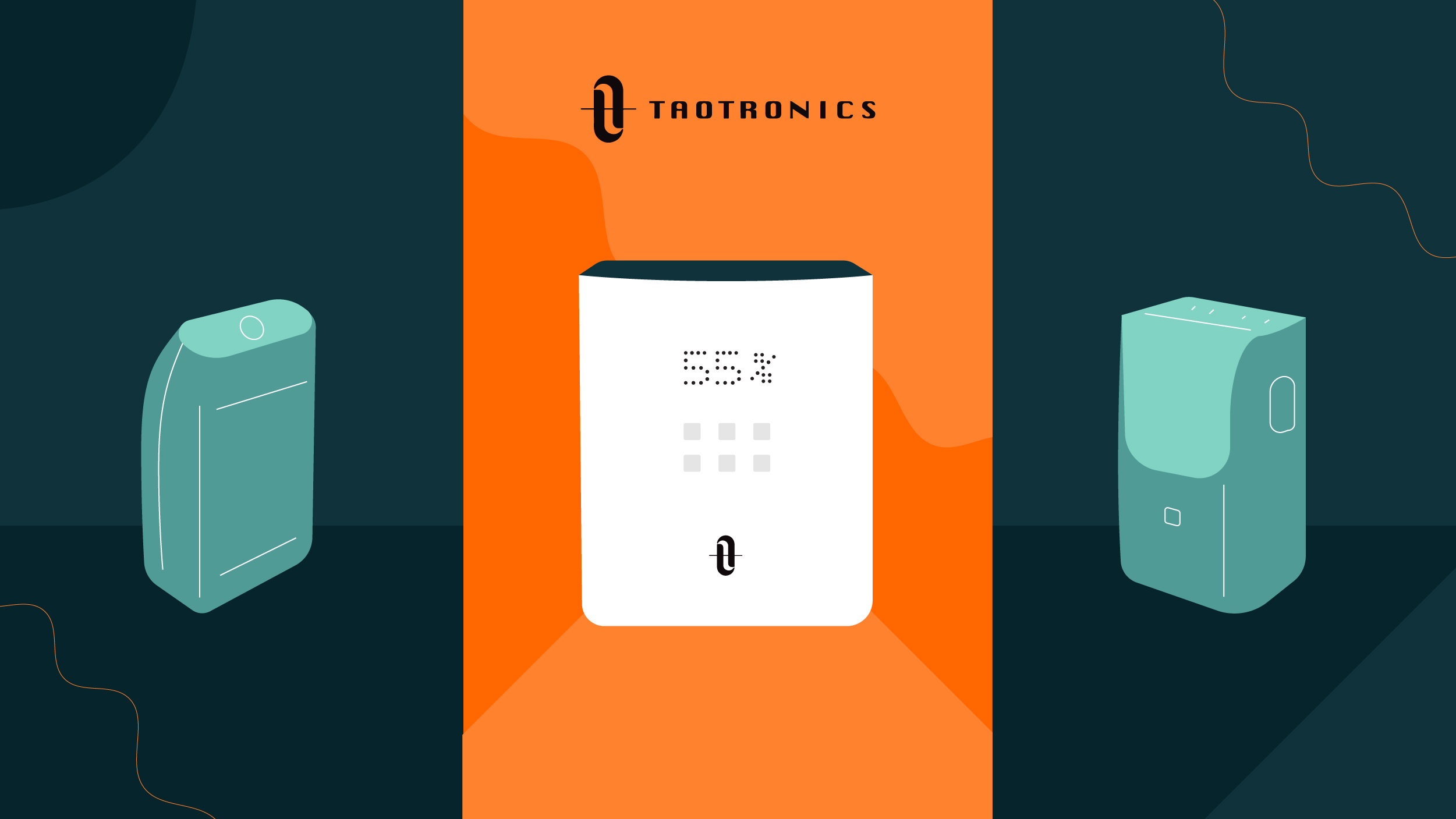When you wake up in the morning, does the air in your room feel damp or dry? Are you sneezing more, have a “scratchy throat”, or feel like your allergy symptoms are getting worse?
It’s time to investigate if you need humidifiers vs dehumidifiers vs air purifiers, and we have some devices and advice that could help.
It can be hard to figure out what you should buy – there are a lot of different devices on the market! But what are the differences between humidifiers and dehumidifiers? And can an air purifier work with either?
These questions and more are answered below!

Humidifier Overview
Humidifiers: A Definition
Humidifiers add moisture to the air in a room, increasing the humidity. They can range from small and portable to large and static (around 5L or more).
How Do Humidifiers Work?
Air always has a relative humidity, with the amount of moisture ranging from 0 to 100%. You feel the difference between high Summer humidity and naturally low humidity in the winter.
If the relative humidity is 100%, we feel much hotter because sweat won’t evaporate from our skin. The air is already saturated with water! If it is below 30%, we feel colder and drier from the water evaporating quickly.
Humidifiers release moisture into the room, increasing the humidity to an ideal level (30-50%).
What Are They Used For?
Humidifiers are used in bedrooms and other rooms where a lot of time is spent. This is important if you are looking at an air purifier vs humidifier; humidifiers are the only way to add moisture. They ease the symptoms including having a dry nose, throat, and lips, and can also lessen sinus congestion.
TaoTronics has a wide range of humidifiers available.
Dehumidifier Overview
Dehumidifiers: A Definition
When looking at the differences between humidifiers and dehumidifiers, the clue is in the name. While humidifiers add moisture to the air, dehumidifiers take it away!
How Does A Dehumidifier Work?
A dehumidifier takes in the air in your room and strips it of moisture, blowing dry air back out. The moisture pools into a collection tank – you need to empty and clean this regularly.
Dehumidifiers work in two key ways. The first cools the air to remove excess moisture, before warming it back up and releasing it into the room. This is called refrigeration. The second way is via absorption/adsorption. The former is where the moisture is absorbed into a material to remove it from the air; in the latter, moisture sticks to a material and is taken out.
What is a Dehumidifier Used For?
If your room has damp or mold, or there is condensation on the windows, it is probably too humid. A dehumidifier can be used to “dry out” the air and maintain lower moisture levels, reducing the risk of mold. This is a key difference when you’re deciding if you should get a humidifier vs dehumidifier.
Air Purifier Overview
Air Purifiers: A Definition
Improve air quality and remove pollutants from the air with an air purifier.
How Does an Air Purifier Work?
These machines trap particles of various sizes (ones with a HEPA filter up to 99.97% up to 0.3 microns). The air is sent through many layers of filters to strip it of pollutants, with clean air pushed back into the room. You need to buy and change the filters regularly. If you buy a device that ionizes particles, make sure it doesn’t produce ozone as that can irritate lungs.
What is an Air Purifier Used For?
Air purifiers are used to reduce the effects of irritants like smoke, pollen and pet dander on your lungs.
Humidifiers vs Dehumidifiers vs Air Purifiers Comparison
| Humidifier | Dehumidifier | Air Purifier | |
| Application | Pushes moisture into the air and increases the humidity level in a room | Pulls moisture from the air and lowers the room’s humidity levels | Removes airborne contaminants through the use of air filters |
| Size Range | Typically small, but up to 5 or 6 liters | Small to Large | Small to Large |
| Filtration | N/A | Single | Multi-stage |
| Purify Air | No | No | Yes |
| Humidity Level | Increases | Decreases | Not affected |
| Noise Level | Soft to Normal | Average to Loud | Soft to Loud |
| Maintenance | Regularly clean and maintain | Regularly clean and maintain | Quarterly to Annual check |
| Average Cost (including Upkeep) | Cheapest | Average | Highest |
Which Do You Need? Humidifiers vs Dehumidifiers vs Air Purifiers
To understand this, you need to identify why you are looking for a device. Our list below might help you decide!
You should look for a humidifier if…
- Your home is in a dry or arid climate
- The moisture levels in your home need to increase
- You experience frequent nosebleeds or sinuses issues, or if dry air aggravates your respiratory system
If you are looking for a new humidifier, we suggest checking out TaoTronics range. From smaller tabletop devices to large humidifiers with a day’s worth of mist, our range suits everyone’s needs.
You should look for a dehumidifier to…
- Get rid of musty smells
- Kill off dust mites, or prevent their spread
- Prevent the aggravation of respiratory condition through high humidity
- Lower your home’s temperature without turning on the air conditioner
- Protect something that may be destroyed by humidity
Air purifiers will help if…
- You experience respiratory issues and need the cleanest air possible
- Allergies mean you need to reduce spores, pollen, pet dander from your home
- Your new year’s resolution is to have a healthier living environment, especially if you live in a city
Frequently Asked Questions
In this section, we answer some of the most common questions about humidifiers vs dehumidifiers vs air purifiers.
Air Purifier vs Humidifier – Which Is Better for a Baby?

If the humidity is too low in your baby’s room, it is safe to use a humidifier. We recommend using a humidifier that is specifically built for babies, like the TaoTronics Whale-Shaped humidifier and nightlight that is BPA free with a cool mist.
Environmental Protection Agency (EPA) guidelines suggest that indoor humidity should be around 45%, although anything between 30-50% is acceptable. You can buy a hygrometer to test the humidity in your baby’s room.
Take care to keep the humidifier out of reach of your young one, ideally on a tabletop on the opposite side of the room to their crib. If a warm mist humidifier was accidentally knocked over, for example, it could cause burns.
Air purifiers protect your little one from unwanted air pollutants. This is especially true if you have recently redecorated the nursery, unwittingly bringing in different types of spores with new carpeting and so on.
Make sure any air purifier you use has a True HEPA filter, great for picking up smaller particles. It should also have an activated carbon filter.
Which Device Should You Choose if you have Asthma?
Asthma should only be treated with doctor-prescribed medications and methods. But often, people with asthma find that a balanced humidity in their bedroom helps alleviate symptoms associated with a dry throat and nose.
If you have asthma, you should remember to use pure or distilled water with your humidifier. This will maximize the benefits to your breathing. You should also regularly clean your humidifier.
Air Purifier vs Dehumidifier – Which type should you choose for allergies?
If you have allergies to dust, pollen, pet dander, or mold spores, you will benefit from air that doesn’t irritate your sinuses. In this case, an air purifier will make all the difference.
Air that it is too humid or dry can lead to allergy-like symptoms, including a dry or runny nose and increase in sneezing. For dry air you should purchase a humidifier. If the air is too humid, a dehumidifier could be beneficial. Dehumidifiers also prevent mold and other spores from multiplying in a moist environment, meaning they are a great extra measure to prevent your allergies worsening.
You need to take stock of your situation and, if possible, visit a doctor to discuss your symptoms and devices that will improve your situation.
Can I use a humidifier, dehumidifier and air purifier at the same time?
Yes! You can use an air purifier alongside a humidifier or dehumidifier in the same room.
If you are using a humidifier with your air purifier, it is recommended that you keep them a few feet apart. This is because air purifiers often have an activated carbon filter, which can be damaged easily by excess moisture.
You should choose between a humidifier vs dehumidifier. Establish which you need, then use them in tandem with your air purifier. It might be good to have different devices for different rooms in your home, to maintain optimum humidity.

Conclusion
In this blog, we have explained how to tell apart humidifiers vs dehumidifiers vs air purifiers. The key difference between humidifiers and dehumidifiers being that one adds moisture to the air and one takes it away, whilst air purifiers “clean” the air! Using these devices can help ease your breathing so you sleep comfortably.
Overall, whether you are deciding between an air purifier vs humidifier or an air purifier vs dehumidifier, it is important to remember that you should see a doctor if you are experiencing breathing issues.
- The Insider’s Guide to Essential Oil Diffusers - January 21, 2022
- Should You Buy A BPA-free Humidifier for Your Baby? - December 11, 2020
- How Humidifiers Can Help with Asthma Symptoms - November 6, 2020

I’ve got a lung sickness that gets worse with humidity, so I want to change my environment a bit. It makes sense that I would want to get a dehumidifier for this! I’ll be sure to find one that is effective.